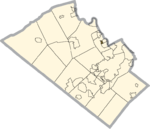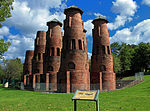Whitehall High School (Pennsylvania)
Whitehall High School is a public high school based in Whitehall Township in the Lehigh Valley region of eastern Pennsylvania. It is the only high school in the Whitehall-Coplay School District. As of the 2021–22 school year, the school had an enrollment of 1,499 students, according to National Center for Education Statistics data. Whitehall High School is located at 3800 Mechanicsville Road in Whitehall Township. The school's mascot is the Zephyr, a train that used to travel through Whitehall Township, and the school's colors are maroon and vegas gold. Whitehall's primary athletic rivals are Parkland High School in South Whitehall Township, Emmaus High School in Emmaus, and Northampton Area High School in Northampton.
Excerpt from the Wikipedia article Whitehall High School (Pennsylvania) (License: CC BY-SA 3.0, Authors).Whitehall High School (Pennsylvania)
Hershey Court, Whitehall
Geographical coordinates (GPS) Address Nearby Places Show on map
Geographical coordinates (GPS)
| Latitude | Longitude |
|---|---|
| N 40.6481 ° | E -75.5041 ° |
Address
Whitehall-Coplay Educational Campus
Hershey Court
18052 Whitehall
Pennsylvania, United States
Open on Google Maps








